- Home
- Anthony Burgess
M/F Page 6
M/F Read online
Page 6
– A doctor, take me to a –
Pardaleos’s two were only too ready. They sidled up smiling, their hands stiffening slowly to hooks. Less feebly, more cunningly:
– No, no, no, keep them off. They did it, they.
A couple of shirtsleeved executive-types flashed their glasses at me and then at them, doing sternly their cuffs up. Then the washroom attendant, a tough old black in white with lined grey elephant-skin, took me about the body.
– You want the first-aid, son? Come along a me.
He got me out of there, and Pardaleos’s men were curiously slow to follow. Indeed, I saw the one with rusty hair move to a urinal, his thumb ready to shell down, pod-wise, his fly-zipper. I was out in the great crowded concourse, free but puzzled. Puzzled also about why I didn’t want to rest up, a weak boy made weaker by the morning’s revelations, in Leisure City. Pardaleos’s proposal seemed all very reasonable. If I’d spent twenty years without a younger sister I didn’t need a younger sister. Why the rush? Still, I said:
– I’ll be all right now, I guess. My plane. Just a temporary –
– You sure? You don’t look none too good, son. Where you aiming to get to?
– Castita.
– Castita? Where’s that?
I knew why the rush. I hungered for Sib Legeru as for the only sanity in the world. Then I saw that Bronxman, all in black, a memento mori to the gay-attired, a briskly moving warning poster of what, for them all, lay beyond this brief spasm of holiday sun. He had in front of him a small fiercely mouthing moustached brownskin in a fawn suit, swiftly propelled in a hidden armlock. Guzman caught, like he’d said he would be, prevented from returning to – A British bell-ringing towncrier, in tricorn, kneebreeches and machicolated topcoat overlaid with the soundtrack of a Russki yesman: I’d filed that image unknowingly.
– Ojeda, I mean. Charter flight.
For Ojeda was, was it not, some four hundred miles due west of Castita?
– You’ll find where the gate is up there on that TV, son. Me, I got to get back to the old waterhole. You sure you going to be okay?
– Thanks, I said, adding: We Guzmans are tough.
5
There I was then, rolling due east a couple of days later in a trim Bermuda cutter called Zagadka II, a nice new job about thirty feet on the waterline and ten feet beam. It was owned by a man called Frank Aspinwall, around forty-five, fleshy and brutally bald, like an Oriental monk or torturer, born in Harrisburg, Pennsylvania, retired from minor fashion-designing for women to a life of moody deep-sea cruising. He hated women and would not even, when referring to his boat, pronominate it to she. He had a companion, also a misogynist, named Pine Chandeleur, twenty-odd, a poet who, I gathered, would desert Aspinwall periodically in one port or another of the Caribbean but turn up in another port, bruised, starved and repentant.
What, I wondered, was the name of my sister? Annamaria, Clarinda, Ophelia, Jane, Prudence, Charity, Carlotta? No, not Carlotta. Not that I gave a damn. It was just idle curiosity. On the other hand, would not this sister be my responsibility when I came of age? Let her finish finishing school, then finish her off in marriage. But then I was assuming that I would endue that stiff shroud of head of family. Why should I? Aspinwall and Chandeleur were free, though in desperate sexual bondage to each other. I had learned to take sex as it came or went. I could, like the imagined work of Sib Legeru, be wholly free. Free even of the grumbling and nagging of my body. I was feeling better now, belaboured by all this ozone, the Caribbean sun clinging to my back. It was as if, now knowing the cause of all my small sicknesses, I could assign them to that cause like so much movable property. I willed them all back to my father.
I was, at the moment, preparing the midday meal – a sort of bouillabaisse of canned herrings, clams and squid, cooked in instant fish stock with onions and peppers, to be followed by a dessert of peach crescents embedded in caramel cream. My galley was aft of the big forecastle that was used mainly as a sailstore – to port, with the not too well stocked pantry, facing the washroom and heads to starboard. Aft of me at work was the saloon, leather settees on each side, table in the middle, small chart table against the forward bulkhead. Pine Chandeleur was lying on one of the settees, straight blondish hair, pebble glasses, fishlike protruding lips that extruded, in vocal tryout, phrases from the long pseudopoem he was working on: Scumstewed, stringlimp, equation proved, equalsign – Nothing about the circumambient sea: all acrid smoky bedsitter sextripe. – Droops, pipe at rest at last from blowing. He was in boiled spinach slacks and a shirt that looked at first like an oldfashioned newspaper shirt but turned out, close to, to be patterned with pages from, for some dirty reason or other, mystical writers. Aspinwall was grim at the helm, naked except for his pipe.
Dorothea, Margrit, Frederica, Ricarda, Edwarda. The hell with her, damnable responsibility.
It had been all too easy boarding that charter plane to Ojeda. Such a mixture of boarding colours, for Ojeda was full of races, that I passed as an unremarkable Caribbean. There was no question of having to show a ticket. A brown man with steelgrey curls ticked off names on a checklist, not looking up. Cortex, right. Cortey, right, right, Cortez. Credite. Manducastis. Right, right, right. Guzman, Guzman, Guzman, right. Most of the passengers were right, that is to say tight. They had been holidaying in Florida and were now returning to an island that had, inherited from the English Muslim fathers who had sailed away from English Puritan intolerance in 1647, fairly stringent drink laws. One passenger took me for genuine Guzman, being presbyopic with whisky, and talked of the time we’d had together at Hialeah Park Race Track. Still, to be on the safe side, I spent most of the flight in one of the toilets. There I considered my future seriously.
I would first have a look at the works of Sib Legeru, as planned, and then, somehow, find my way back to the United States to wheedle money out of the keepers of my father’s coffers, enough to sustain me in peaceful frugality for a year or so while I tested myself for creative talent. I would, I decided, be moderately docile when it came to the laying down of prohibited areas, such as the South of France where Nice was and my sister would shortly be. I did not like being tricked, that was all. Tell me all, however unreasonable, and I respond rationally. Sister: I could not get over having a sister. The deceitfulness of it. But it was easy enough switching off the knowledge of having a sister. What did having a sister mean, after all? It meant as little as being – but this was a bond with her, I could not deny that this was a sort of bond – born of an incestuous union. For there were people in the world, thalidomide babies, dwellers in goitrous valleys, oversmokers, cyclamate-drinkers, exhaust-breathers, who had real sicknesses, and I could not say that my body’s little caprices rendered me so sick as to be taxonomized as one of life’s permanent invalids. The whole of the stupid past is our father, just as the whole world is our hospital. A recitative, that latter, I remembered stupidly, from Bach’s Cantata for the Fourteenth Sunday after Trinity. That, of course, was my other kind of sickness.
Let me go, say, to Mexico, to some nice quiet dirty place like Hidalgo or Manzanillo, and there, living on tortillas and tequila, see whether this formless mind of mine, a medieval quarter crammed with junkshops, could make inconsequentiality yield significance. What I had the notion of doing was, in fact, the writing of a play. I recognized in myself a certain histrionic gift, another term for exhibitionism. I could imagine any number of theatrical situations. The working of them out in action, my own, could be thrilling, like that Carlotta business, but it was also wearisome and dangerous. Better to have theatre where it was supposed to belong, namely in the theatre. I had no play-shape stirring in my mind, but I had a lot of situations which could be strung together. There, in the toilet, soothing myself with the airline’s toilet-water, I conceived a scene with great distinctness:
GEORGE. Half-regained Cimon the spider-crab.
MABEL. A pelican fish of Herculean proportions. The three Eusebii in baskets, I mean Basque berets.<
br />
GEORGE. Yes yes. The thundering legions.
These words to be spoken on a bed, with copulation proceeding. The significance, of course, would lie in the inconsequentiality. Being so young, I did not realize that this sort of thing had already been done.
We arrived at Ojida airport, which is just outside Blakeslee, the wretched dump they call their capital. What I needed now was sea-transport, passage-working, to Castita. I asked in the coffee-bar opposite the town air terminal what chances there were, and I was directed to the bar of the Besson Hotel near the Marina. There I met Aspinwall and Chandeleur, pointed out to me by the bartender as yachtsmen who proposed, for the sake of a change and in default of something better, taking a trip to Castita for the Senta Euphorbia fista, all statued processions, fireworks, candyfloss, miracles and drinking. Aspinwall and Chandeleur were not at first too sure whether they wanted me, but when I said I could cook they said they were sick of their own cooking and each other’s. Urgent, I said. Good, they could do with the condiment of a little urgency.
Why urgent? Why, for God’s sake, urgent? Because Loewe and Pardaleos had said it was not urgent. Did they not, then, understand the selfwilledness of youth, that if they employed weapons on behalf of non-urgency I would turn urgency itself into a weapon of my own? I said:
– I thought of spending a week there.
– A week will suit us too. You can sleep on board.
– And you?
– Sometimes on board, sometimes not. It all depends on what comes up.
So now, twin-elemented in frightful fire and turquoise but surrounded in the saloon by comfortable artefacts, we had some bourbon and lime juice and then ate lunch. On Pine Chandeleur’s left sleeve I read: The more God is in all things, the more He is outside them. The more He is within, the more without. Aspinwall spooned through his fish-soup distastefully, looking for some odd solidity that he thought he might possibly bring himself conceivably to eat, then said:
– Barometer’s two millibars lower than the book says it ought to be.
– Signifying what? Chandeleur asked, showing a grey bolus of chewed fish. He always showed what he was eating while he talked at meals, a bad habit like his verse. This depth is called the centre, the fund or bottom of the soul.
– Signifying a bitch of a storm somewhere offstage. Not usual this time of year.
He knew all about the sea, the worst of bitches. I nodded. I’d had an intimation of a remote promise of nausea while in the hot galley. It was not my father, then.
– Put the trysail on her after lunch, I guess.
He did not seem to like his bouillabaisse. I brought in the dessert, which wobbled on the table. He dug his dessertspoon in delicately and fished out a sicklemoon peachslice. He examined it as though for flaws. There was a perceptible shaking in the adherent custard. He said:
– Right.
Pine Chandeleur ate heartily, then went back to his pseudo-poem on the settee. Aspinwall and I got the weighty canvas up on deck by way of the forehatch and dragged it aft of the mast. He got down to reeving the lacing and halliard and sheets while I watched him. There was a wind rising, sure enough. He hoisted the sail and I pulled the sheet taut to the cockpit. We got the spinnakers down, he the lee and I the weather, and stowed them. Then he set the storm jib. He said:
– That should do it. It rides well like this. How about some coffee?
I made coffee, instant freezedried perked. Chandeleur lay there on the settee, looking up, his eyes vacant. On his belly: The Atman is that by which the universe is pervaded, but which nothing pervades; which causes all things to shine, but which all things cannot make to shine. While I was bringing the coffee-mugs in he said:
– I hate storms.
– I thought poets liked them.
– Not this poet. Frank likes them, though. He loves them. It makes him feel all masterful, fighting them. Like the Flying Dutchman or somebody. He can cope, you see.
I called that coffee was ready. Aspinwall wanted Chandeleur to take the helm. Chandeleur said:
– I’m not taking the helm. I must lie here. Storms petrify me, even in prospect.
So I took the helm while Aspinwall went below for his coffee. The wind was rising steadily and a thin high film of cloud was at work on the sun, lunifying it. I was cold in my slacks and shirt. Soon Aspinwall came up to lock down the forehatch and to fit the weatherboards over the cabin skylight. He said:
– Force six wind, I reckon. Bitch bitch bitch.
Bitch indeed. Aspinwall went below again to dress himself in stormgear. He came up, grimly masterful, took the helm from me and said:
– Get down there and start making a lot of sandwiches. Plenty of mustard in mine, Dijon mustard. Very strong black coffee in the thermoses, laced with brandy. Not the Cordon Bleu, though. Too good for lacing.
– It’s going to be pretty bad, is it?
– A bitch.
– And what’s your er friend going to do?
– Lie there. Just lie there.
The Inner Light is beyond praise and blame; like space it knows no boundaries.
I made sandwiches with readysliced bread and canned pork-meat, salami and cheese-shives. Chandeleur moaned. I brewed coffee black as a dog, and made it growl and bark with cognac. I took the two big thermoi (?) and kennelled it safely, then I put on my coat and went to the forecastle to look for storm clothing. There was only one set there, and, for that matter, there were only two lifejackets: these were of a sick orange colour. Chandeleur saw me dressing up for tough seamanship and didn’t like it.
– How about me?
– You’re going to lie there.
– Oh.
Behold but One in all things; it is the second that leads you astray.
I went up to help Aspinwall. The wind was increasing, to his satisfied grimness. It was not easy to take in a reef on the trysail. Aspinwall backed the foresail a bit and hove to on the starboard, or maybe port, I can’t remember, tack. The vessel lay fairly comfortably then, doing two knots or so to leeward. Then we went below. Chandeleur had brought sandwiches in from the galley and was wolfing away. He had a smoking mug of laced coffee. He munched:
– I get hungry when I get frightened.
If you call God good, or great, or blessed, or wise, or anything else of this sort, it is included in these words: He is.
– St Bernard, I said.
– Eh?
– On your right tit.
– Leave him alone, Aspinwall said.
– All I said was –
– Leave him alone.
– Sorry, I said, not wanting trouble, knowing they were both unbalanced. Chandeleur took another sandwich and said:
– And how about this just above my navel?
It is God Who has the treasure and the bride in Him; the Godhead is as void as though it were not. I said:
– I think it’s Meister Eckhart.
– Eckhart, said Aspinwall. Don’t mention that name here. We need all the luck we can get.
– But Eckhart was a great mystic, I said.
– Eckhart was a great son of a bitch. Eckhart was a chiseller. I wouldn’t be where I am now if it wasn’t for two-timing shystering Eckhart.
– And where are you now? Chandeleur asked. Or, I should say, where are we now?
– Wherever it is, it’s still some place in the Caribbean.
He lurched over to the chart-table to brood over a chart, grabbing a sandwich as he went. Brooding, he bit it bitterly and chewed a while. Then he said:
– Not enough mustard.
– Sorry, I said. Chandeleur said: l
– A sort of Godboy, are you? All that about St Bernards snuffling at my right tit.
– You’re all dressed up in God, I said. I’d call that a Godshirt. Apotropaic, is it? To ward off storms and other nastiness?
– Shut up about God, cried Aspinwall indistinctly through bread, salami and not enough mustard. We need all the luck we can get.
God, like
a dog, hearing his name, leapt in a great slavering joy upon us. The sea cracked and ground at the bones of the bows in a superb accession of appetite. We rode rocking-horse the quaking roof of the waves. Aspinwall cried:
– God Jesus Christ Almighty.
There was an apocalyptical rending above us and then the thudding of wings of a tight and berserk archangel. Aspinwall bounded for the deck, sandwich in hand, and I lurch-followed. Brine spray spume jumped on us ecstatically. He threw his sandwich savagely into the rash smart slogger, which threw it promptly back, as he gaped appalled at the fluttering flagrags of old laundry on the bolt ropes, stormjib eaten alive, trysail sheet-blocks hammering. He had time to look at me with hate before yapping orders that the wind swallowed untasted. A war, a war, or something. No, a warp. But what the hell was a warp? He tottered to the forecastle himself, cursing, while I clung to a rail. Then I saw what a warp was: a sort of towline. He and I, he still going through a silent-movie sequence of heavy cursing, chiefly at me, got the trysail down and then furled it with this warp to the main boom. There was no sail up at all now. The yacht just lolloped moronically in the troughs. It was a complicated torture of an idiot child tossed by one lot of yobs in a cloth, another gang of tearaways singing different songs loudly and pounding him, her, it with icelumps that turned at once to warm water. Night, as they say, fell. At the helm I left Aspinwall, whipped by warm water that broke in heads of frantic snowblooms, and went below, being scared of being washed overboard.

 A Dead Man in Deptford
A Dead Man in Deptford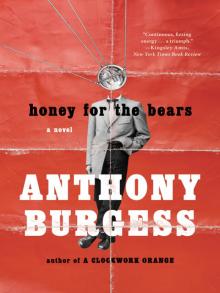 Honey for the Bears
Honey for the Bears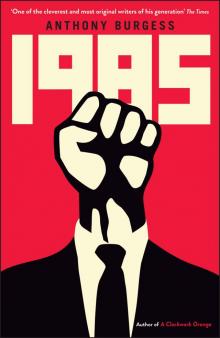 1985
1985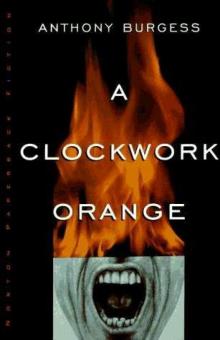 A Clockwork Orange
A Clockwork Orange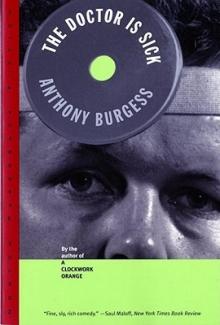 The Doctor Is Sick
The Doctor Is Sick Earthly Powers
Earthly Powers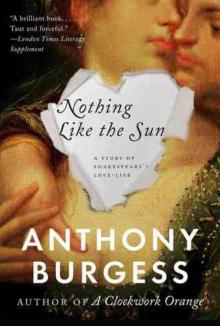 Nothing Like the Sun
Nothing Like the Sun Collected Poems
Collected Poems The Kingdom of the Wicked
The Kingdom of the Wicked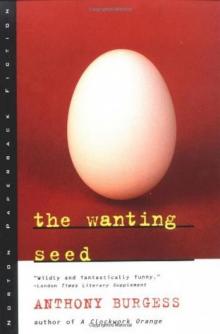 The Wanting Seed
The Wanting Seed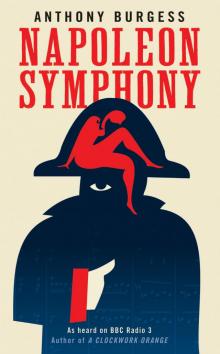 Napoleon Symphony
Napoleon Symphony The Malayan Trilogy
The Malayan Trilogy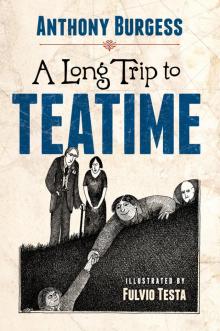 A Long Trip to Teatime
A Long Trip to Teatime Enderby Outside
Enderby Outside M/F
M/F The Complete Enderby
The Complete Enderby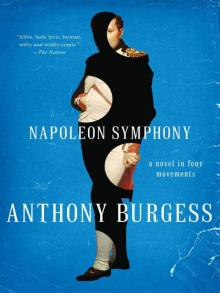 Napoleon Symphony: A Novel in Four Movements
Napoleon Symphony: A Novel in Four Movements Enderby's Dark Lady
Enderby's Dark Lady The Clockwork Testament (Or: Enderby 's End)
The Clockwork Testament (Or: Enderby 's End) ABBA ABBA
ABBA ABBA A Clockwork Orange (UK Version)
A Clockwork Orange (UK Version)